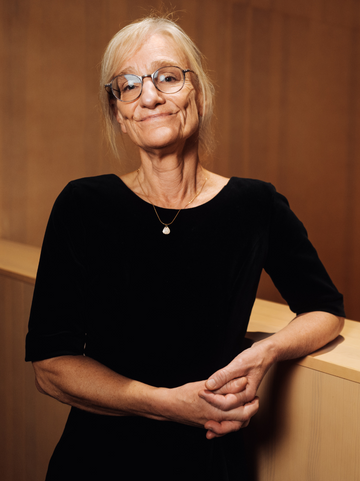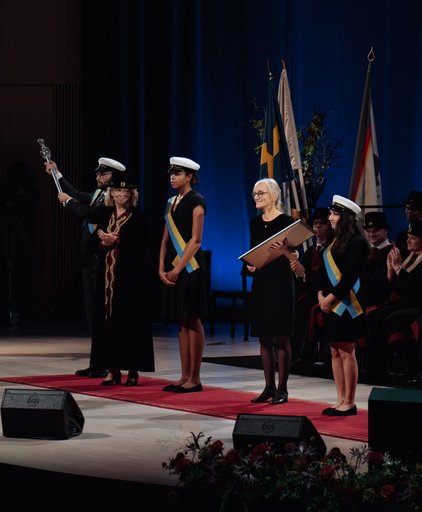2023 Medicine Prize
Marie-Louise Lydrup is celebrated for the care few dare to talk about
The 2023 Mogren Medicine Prize is awarded to Dr Marie-Louise Lydrup, surgeon and chief physician at Skåne University Hospital. Lydrup is awarded the prize of SEK 250,000 for her distinguished care provision for patients rehabilitating after pelvic cancer, a complex treatment associated with severe stigma.
"Surgeons must have the courage to tell a patient that they could lose their sexual function after pelvic cancer surgery. If you know your patient very well, you can build a relationship based on trust in which these matters can be discussed."
Marie-Louise Lydrup
Jury motivation
"Dr Marie-Louise Lydrup has shouldered an incredibly complex, stigmatised and overlooked need for care, pelvic cancer rehabilitation, and thus made it possible for countless patients to have a better life after cancer. She demonstrates an inexhaustible commitment and care for her patients, far beyond what is expected."
Surgeons need to have the courage to talk about sensitive matters
Talking about how your sexual function is affected by pelvic cancer surgery is sensitive, so many surgeons simply gloss over the topic. The 2023 Mogren Medicine Prize winner Marie-Louise Lydrup is fighting for more focus on the patient meeting and to create a trust that will stand strong even in the face of the most difficult conversations.
“It sounds like a paradox, but caring for people with advanced cancer is simple. The surgery is hard, formulating the questions is hard, but the actual care is simple. Perhaps because the message is clear: You don’t know how successful the treatment will be, but you know that without it you won’t become healthy,” says Dr Marie-Louise Lydrup.
She works as a colorectal surgeon, specialising in complex pelvic surgery and is one of the only Swedish surgeons who performs anal cancer surgery.
In the break in between scientific meetings, she is often found on the phone, her colleagues say. While others are drinking coffee, she is trying to figure out pain management for a despondent palliative patient on the other side of the country. Her extensive and never-ending care for her patients is widely known.
“My patients are carried with me in a kind of deposit because they inspire me. We can be prone to a preconceived idea that a person is low on resources, but I am often struck by that almost everyone manages to mobilise the power to get through hardship,” she says.
She especially remembers a person with a substance use disorder who fell ill and who inspired her with their determination and strength.
“This patient managed to break free from their addiction, pull themselves together, and show up for their treatment. It was absolutely incredible, and something I will never forget,” says Marie-Louise.
The treatment few dare to talk about
Pelvic cancer rehabilitation is a complex, stigmatised and overlooked type of care, Marie-Louise says. But why is that the case?
“There is a risk of losing your sexual function after pelvic cancer surgery. Many surgeons find it difficult to talk about and want someone with more expertise to do it instead. But, as the operating surgeon, I must be the one driving the conversation to best prepare for rehabilitation. That is the most basic care.”
Through her specialisation, Marie-Louise has enabled many patients to improve their quality of life post-cancer. It’s based on a steady development of complicated surgical treatment, as well as a tireless focus on compassionate patient meetings.
“The conversation about the sexual side effects of removing the colon cannot be run through according to a checklist, as it would only lead to missing the target. If you know your patient well, you will build a strong enough trust to withstand even the hardest conversations, which is a prerequisite for the best rehabilitation standard.”
Getting to know your patient is difficult and requires many invested hours. Marie-Louise Lydrup calls that flight hours.
“You have to practice seeing beyond a patient and their diagnosis. Look less to how they have lived their lives and more to what their attitude to life is. That will allow you to sense, value, and really see just what your patient needs for you to provide better care.”
Continuity leads to the type of care we all wish for
For many patients, health care is marred by unnecessarily long waiting times, cumbersome administration, and a plethora of new faces at each visit. Marie-Louise considers the designated small amount of time per meeting to be a nonchalant attitude toward the patient.
“We didn’t put ourselves in the patient’s shoes at all when we organised health care flows. We are stuck in a vicious circle that does not result in the care we strive to provide. We have to dare to invest in continuity and compassionate patient meetings,” she says.
The prospect of following your patient throughout the care and avoiding them being passed off between different doctors is one of the things Marie-Louise advocates for.
“A safe and well-informed patient can afford to pour all their strength into getting ready for surgery. That makes it possible for us to conduct the best conceivable treatment, and that is what we all want in the end.”
About Marie-Louise Lydrup
Marie-Louise Lydrup is a colorectal surgeon, gynaecologist and associate professor who works as a senior physician at Skåne University Hospital. She actively educates resident physicians and doctoral students.
She is one of the surgeons in Sweden who operates on cancer, which in female patients often involves a combination of bowel surgery and gynaecological surgery. She has also started a remote education course for surgeons in the Southern Healthcare Region.
Through extensive experience in two different specialties, Marie-Louise has dedicatedly offered patients who have been cured of cancer rehabilitation-focused examinations that can make life after treatment better.



